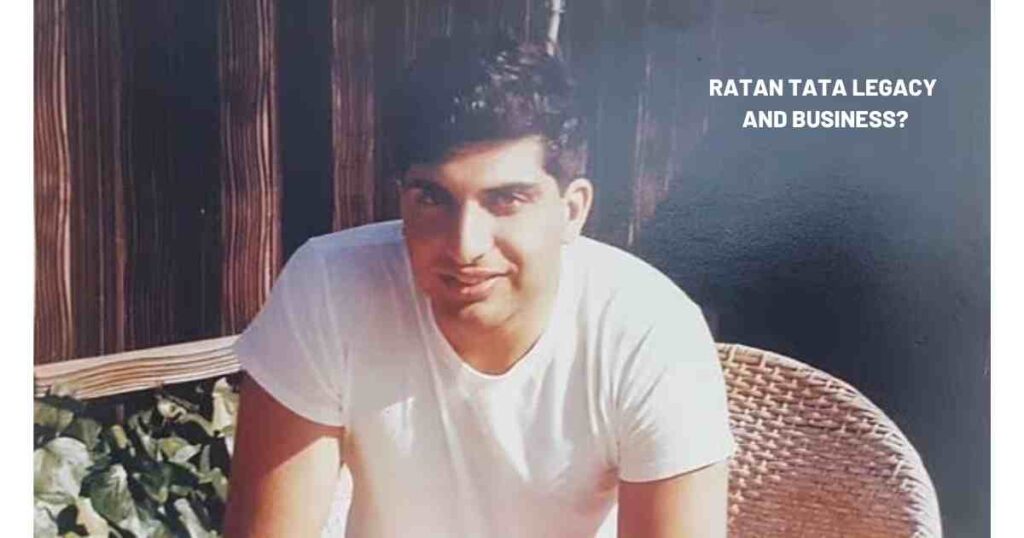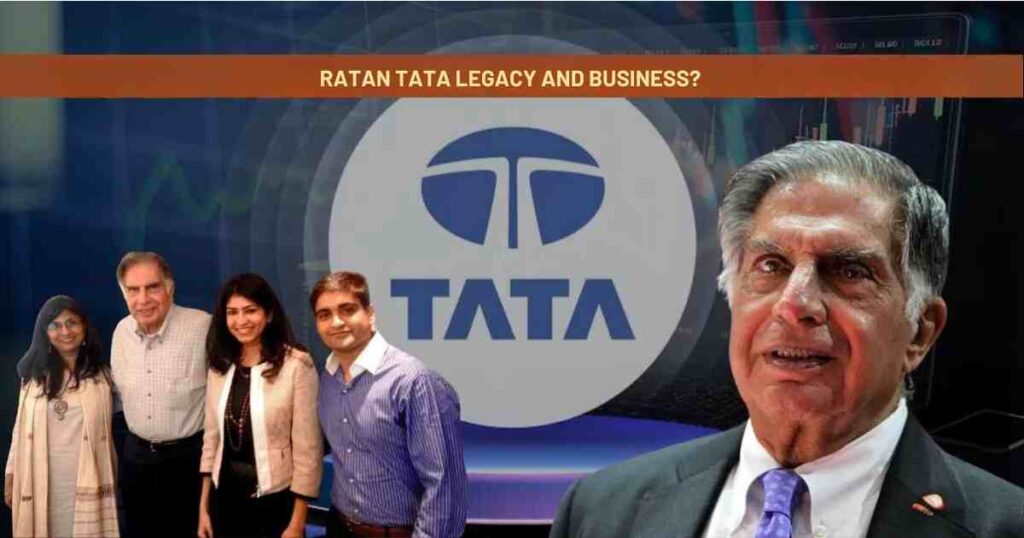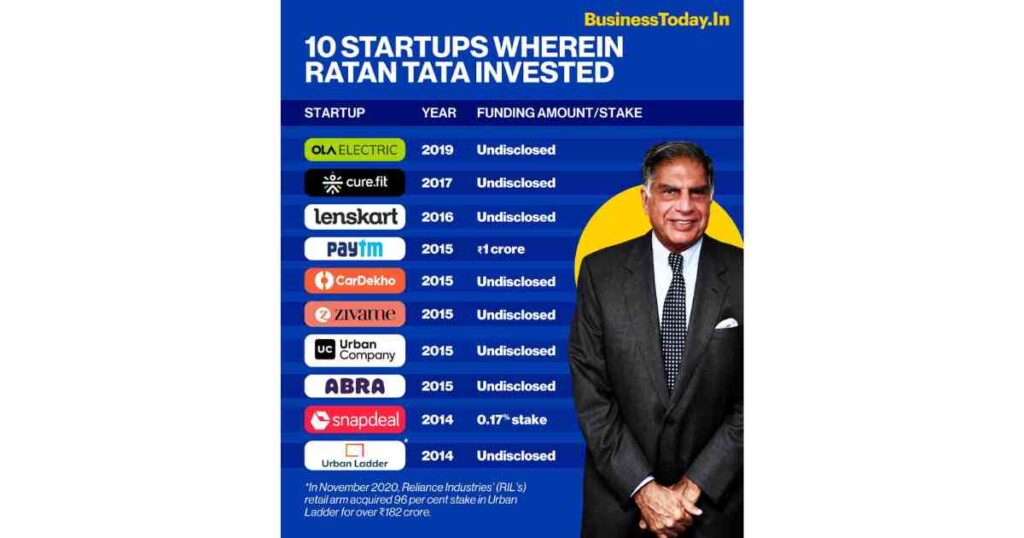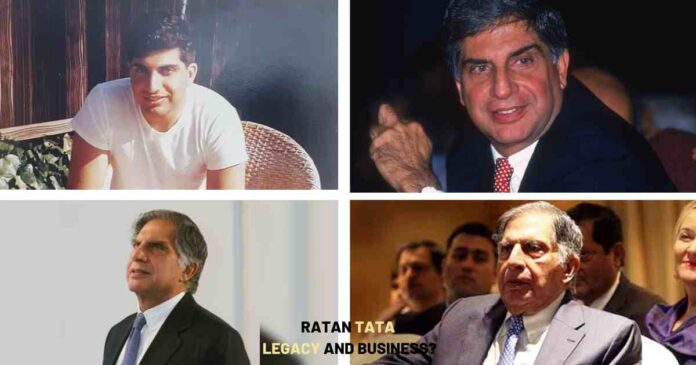Ratan Tata is far from being a name; it is an institution inspiring millions. Former Chairman of Tata Sons, the holding company of the Tata Group, Ratan Tata took the conglomerate to great global heights while remaining ethical.

Early Life and Education :
Born December 28, 1937 Ratan Tata is the grandson of Jamsetji Tata-the founder of the Tata Group. The descendant of one of India’s most aristocratic families. Not that life was smooth sailing as he managed to climb mountains against his will, starting with being thrust into the middle of his parent’s divorce. He had the grandmother, that is to say, Lady Navajbai Tata who brought up him after his parents separated.
Early in his life :
Moving on to the education of Ratan Tata, Ratan Tata passed out from Cathedral and John Connon School in Mumbai, where he completed his schooling. After that, he did Bishop Cotton School in Shimla. In 1962, he graduated in Architecture from Cornell University in the United States. In the meanwhile, In 1975, he received an Advanced Management Program at Harvard Business School, which worked as a brush that strengthened his business parlance.
Leadership at Tata Group :
Ratan Tata assumed the Tata Group control in 1991. At that time, the company underwent such radical transition. He led some of the major acquisitions Tetley Tea, Jaguar Land Rover, Corus Steel, which brought the Tata Group into the world arena. His leadership was innovative and strengthened with a base of ethics; he is also keen on corporate social responsibility.
Organizations of Ratan Tata and Contributions :
Diversification is another key element of Ratan Tata’s companies. The Tata Group has interests which range from steel, automotive and telecommunication to information technology, hospitality, and consumer goods. Among the flagship companies are Tata Consultancy Services (TCS), Tata Steel, Tata Motors, and Tata Power-the companies that have been more popular around the world under his leadership.
Apart from business, Ratan Tata is an active philanthropist with the Tata Trusts, funding initiatives in healthcare, education, and rural development. He has impacted India’s social fabric beyond measure by empowering underserved communities.

Ratan Tata’s Net Worth: A Unique Story :
While most industrialists flaunt personal wealth, Ratan Tata’s story is an exception to the rule. While his company is in fact one of the largest conglomerates in the world, his personal wealth is quite moderate since most profits from Tata Group end up in various charitable trusts. In fact, these trusts own around 66% of Tata Sons, which means that Ratan Tata is one of the rare, humble billionaires who finds himself in a world of hyper-rich tycoons.
Estimation puts his wealth in the range of $1 billion, but this amount does not even begin to reflect the Tata Trusts-a fiefdom that oversees tens of billions of dollars in assets and funds various social initiatives all over India.
Retirement and Legacy :
Although Ratan Tata stepped down from the Chair of Tata Sons all the way back in 2012, it is well within his purview to make the firm walk the line as well as determine what that line should be. Natarajan Chandrasekaran has continued to grow and change following in his predecessor’s footsteps. Of course, even in retirement, Ratan Tata continues as a strong voice, presumably on matters of business or philanthropy.
Of late, Ratan Tata has also been coming out as a mainstream investor of startups, and proves a testament to his continued belief in innovation and the future of technology. With more presence in social media, most of the young boys and girls look up to Ratan Tata as the even more revered leader.
Startup Investments by Ratan Tata :

Driving Innovation at the Entrepreneurial Ecosystem of India.
Ratan Tata, as a matter of fact, is a business magnate and philanthropist. Based on this reason, he has also become one of the principal players in India’s developing startup environment. Ever since Ratan Tata resigned from Tata Sons back in 2012, he has provided substantial investments into the startups to foster innovation and to heighten entrepreneurial skills in every sector.
A New Chapter: Ratan Tata forays in the Startup World
Ratan Tata pivoted to the emerging entrepreneurship and eventually started his investing journey into startups. Thus far, he has invested in over 50 startups from technology and e-commerce to healthcare and social enterprises. He further went on to invest personally in many startups, with investments in these startups helping them scale as well as gain much-needed traction. The result is that Tata is regarded as one of the most respected angel investors in India.
Some Notable Startup Investments by Ratan Tata :
Here are some of the most prominent startups that have been backed by Ratan Tata:
Ola One of the leading ride-hailing services in India, Ola received the investment from Ratan Tata in 2015. His venture capital proved to be adding credibility to the company and having the ability to compete with the global players like Uber within India.
Paytm Ratan Tata also invested in the digital payment platform Paytm, which is amongst the most widely used in India. By this very early investment in one of the largest fintech companies, Paytm’s growth also helped it to become a dominant player in the Indian digital payments space.
UrbanClap (now Urban Company) Today, it is called Urban Company but started under the name UrbanClap. It is a home services marketplace connecting consumers to service professionals. Investment from the legendary Ratan Tata helped the company grow rapidly and expand to multiple cities across India and others abroad.CureFit Ratan Tata has also committed to the health and fitness platform of co-founder Mukesh Bansal, former CEO of Myntra. CureFit operates its business in fitness, nutrition, and mental wellness through these offerings, expanding at a fast clip via Tata’s backing.
Lenskart Another high profile start up in which Ratan Tata made an investment was Lenskart, an Indian online eyewear retailer. His financial investment and guidance helped the company to build into one of India’s famous eyewear brands, and hence it has increased its both online and offline presence.Snapdeal The other well-known start up on which Ratan Tata made an investment was also Snapdeal-the Indian e-commerce platform. Although the competition was highly ravaging with Amazon, and Flipkart, still recognition and growth were brought into the Indian e-commerce marketplace by Tata’s investment.
FirstCry FirstCry is another e-business with specialization in baby-related products that were also in Ratan Tata’s list of portfolio investments. Their support helped FirstCry turn out to be a brand new parent treats all his/her needs with multiple categories under its offerings.Zivame Zivame is another online lingerie-related e-retail company that had benefited from this financial investment by Tata. His financial input resulted in Tata’s goal of providing an empowered shopping experience for women, across India.
Urban Ladder: Ratan Tata also funded it in the furniture and home décor space. His investment has helped it achieve a great hold in the online furniture market over its competitors, such as Pepperfry.
Another popular online marketplace for buying and selling cars is CarDekho, which has investment by Tata. His finance and guidance have caused CarDekho to grow in leaps and bounds, thereby becoming a name to reckon with in the Indian automotive segment.
What Makes Ratan Tata Different as Startup Investor?
Ratan Tata’s interest goes far beyond investment in the financial sense. He is a role model for entrepreneurs on many counts and an inspiration by being a mentor and a strategic advisor. The reputation he has earned as a scrupulous leader makes him of high value in the journey to growth for any startup. Unlike most venture capitalists, he is not looking for financial returns but innovative meaning and solutions to real-world problems through the startup.
In many ways, Tata has preferred investments in companies with elements of social impact, as part of a much more comprehensive vision of responsible enterprise. The development of the Indian entrepreneurial ecosystem reveals how he would be contributing to providing for an active new generation of leaders and innovators.
Future of Ratan Tata’s Venture Involvement
At 80, Ratan Tata continues to invest in start-ups. His timing is such that he finds the disruptive ideas when they are really nascent; that’s what makes him a valuable figure for the Indian start-up community. When the world is changing at the speed of technology evolution and new sectors coming alive, Tata as a mentor and an angel investor should represent an important blip on the Indian entrepreneurial landscape for years to come.
Conclusion :
An industrialist, Ratan Tata is nothing but a personification of integrity, vision, and compassion. From education to Tata Group stewardship and well beyond, Ratan Tata’s life is an epitome of leadership rooted in ethics. His legacy will inspire generations to come in the business as well as in social responsibility.
Tata Trusts: Empowering India Through Philanthropy
Tata Trusts are some of the oldest and most significant philanthropic organizations in India. Constituted by different members of the Tata family, a vision of catalyzing social change, enhancing quality of life, and fostering sustainable growth existed across the Trusts. The Trusts occupy a distinctive position in Indian business history due to their scale, structure, and impact.
Origins and History of Tata Trusts :
Tata Trusts were established by Jamsetji Tata, founder of Tata Group, and the subsequent leaders such as Sir Dorabji Tata and Sir Ratan Tata carried forward and expanded them. The first major trust of Tata Trusts is the Sir Dorabji Tata Trust, which was established in the year 1932 for multiple objects like economic development, scientific research, and welfare of society.
Over the years, more trusts were instituted, among them the Sir Ratan Tata Trust, in 1919; and many other smaller trusts are now brought together under the banner term Tata Trusts. These entities together hold about 66% in Tata Sons, the holding company of the Tata Group. The dividends paid out by Tata Sons form a source of funding for the philanthropic efforts of the Trust, and as such constitute an essential aspect of the Tata Group business model.
Tata Trusts Organisation Structure :
Tata Trusts function entirely independently of Tata Group’s business and only handle philanthropy. The boards of trustees run the trusts, and until some time back, Ratan Tata was also its chairman. These trusts are substantial shareholder owners of Tata Sons, but their earnings do not accrue to individual shareholders but to several charitable programs.
Their work falls under several key sectors, including healthcare, education, rural and rural-based development, water and sanitation, and arts and culture. They work in research with the government, non-profits, and other institutions to produce programs that last.
How Tata Trusts Works: A Closer Examination
Funding and Ownership Structure Tata Trusts get most of its source of funds due to the shareholding in Tata Sons. Most of the profit generated from Tata Sons is contributed to the Trust. That means it has more than enough money set aside for the realization of philanthropic programs. The structure was unique in the sense that the wealth being produced by one of India’s biggest corporations is invested in social causes and not for personal or corporate gains.
Focus areas Tata Trusts embrace everything and all kinds of initiatives to reach out on this vast canvas and hit the focal areas of eradicating poverty, health, education, and environmental sustainability. These include:
Healthcare: It has founded a chain of hospitals, particularly supports Tata Memorial Hospital, which is one of the premier institutions involved in cancer care and research, and it also works towards maternal and child health, nutrition, and successful fighting against TB and malaria.
Education: Tata Trusts, in its efforts, has greatly concentrated on education. This is the granting of scholarships to students and research funding to make quality education available in rural and underprivileged areas. They set up institutions such as Indian Institute of Science (IISc) and Tata Institute of Social Sciences (TISS).
The Rural Development: Tata Trusts help reduce poverty and enhance living standards in rural areas by initiating efforts meant for productivity enhancement in agriculture, improvement in rural livelihoods, and water conservation. It invests in developing the rural society with resilience by investing in skill developments.
Water and Sanitation: The Trusts are strongly committed to clean drinking water and sanitation infrastructure in less privileged regions of India. Programs are envisioned to address water shortage, and support hygiene, both in the urban slums and village areas.
Social Justice and Inclusion: As social justice, Tata Trusts also embrace issues connected with gender mainstreaming and child protection and support marginalized communities. Programmes involving women empowerment and getting legal rights for deprived sections become integral parts of its social justice agendas.Partnerships and Collaborations The Tata Trusts often work in partnership with government agencies, NGO, international institutions, as well as local communities.
Many of the collaborations are very important for scaling their programs so that the initiatives can touch the right people who need them most. Some recent examples include such collaborations by the Tata Trusts, where they have collaborated with the Government of India in the National Nutrition Mission and the Swachh Bharat (Clean India) campaign.
Innovation and research Tata Trusts are innovative in all walks of life. They finance research projects and invest in new technologies to end India’s problems. For instance, they have done crops with data and technology to increase the yields of the crops. They also try to give as little water as possible to the crops for watering.
Impact of Tata Trusts :
Tata Trusts impacts millions of lives across India, touching upon and influencing millions. Tata Trusts have shaped India’s social development journey for over a century, with premier institutes of research, pioneering healthcare services, and rural development programs.
Some of its most notable work involves:
Health care: It was through Tata Trusts that Cancer research and treatment in India were promoted. The Tata Memorial Center in Mumbai, today stands out as one of the prominent institutions across the world which offers cancer treatment and research.
Education: In the form of scholarships and institutional funding, Tata Trusts have facilitated higher education for hundreds and thousands of students, which forms a meaningful contribution to the knowledge economy of India.
Disaster Relief: From the Indian Ocean tsunami in 2004 to the COVID-19 pandemic, the Trusts remain involved in various forms of aid. Recently, during the pandemic of COVID-19, Tata Trusts made great contributions in relief work, funding health infrastructure.
Ratan Tata and Tata Trusts
Through Ratan Tata, the Tata Trusts came closer to many people in aspects of activity. Ratan Tata has infused a sense of strategy to the activities of the Trusts; the work should be scalable and would lead to long-term impacts. He is keenly interested in health-care, education, and entrepreneurship to make the Trusts’ work relevant to India’s emerging social and economic challenges.
Philosophy: Leadership with a purpose and integrity-since Ratan Tata
Ratan Tata is known more than for his business acumen; rather, he is admired for his individuality in leadership, ethics, and way of life. His philosophy was so much grounded in values that it defined his career and the companies he worked for. This tendency to focus on ethical leadership, humility, and giving back to society would give, by and large, a template for responsible leadership and life.
- Ethical Leadership
Ethics seems to be at the very core of Ratan Tata’s philosophy; he has always wanted to make a distinction between doing right and making money, even if it went extremely hard. Tata Group, under his leadership, is known to have refused corrupt practices at all costs, including losses in major deals. His policies thus brought immense respect worldwide, for him as well as for the brand of Tata.
Ratan Tata often refers to holding one’s integrity in business:
“I don’t believe in taking right decisions. I take decisions and then make them right.”
This statement reflects his approach of aligning action, after they have been taken with values and ethics, while keeping the sequence of decision-making intact and holding onto integrity. - Humility and Simplicity
Though Ratan Tata heads one of the world’s biggest conglomerates, he never boasts of wealth or power. He is skeptical, keeping himself humble and simple in his lifestyle. He believes in staying grounded and doesn’t flaunt his wealth or position. As one of India’s most powerful men, Tata remains known for his personal simplicity. He often lives in modest apartments, drives himself to work, and shies away from ostentation.
Tata’s humility is reflected in all the relationships with people at any level. He pays more attention to human relationships than to rank and position, takes his time to personally meet people, and listen to their stories and share wisdom with junior entrepreneurs. - Long-term Vision and Sustainable Growth
The other important feature of Ratan Tata’s philosophy is long-term thinking. More often than not, business leadership chases short-term gains, and Tata always looked towards sustainable, long-term growth. Global acquisition of companies, such as Tetley, Corus, and Jaguar Land Rover, were part of his vision for Tata Group becoming a global giant. The acquisitions were considered high risk at the time but were a much-needed bold decision to drive growth and competitiveness, even if only in the long run at the cost of sustaining short-term gain.
This was forward-thinking also in the company commitment to social responsibility. Success in business without societal input was incomplete for Tata. Long before the buzzword “corporate social responsibility” became commonplace in business, he never stopped talking about corporate social responsibility. - People-Centric Leadership
Business is fundamentally about people-customer, employees, or communities says Ratan Tata. Hence, he is the people-driven leadership head. He pays extreme focus toward benefiting employees and customers. Tata companies are structured in such a way that the benefit of those structure is not just shared by shareholders alone, but also by the employees and society as a whole.
For instance, the Tata Nano, the world’s cheapest car was designed based on the inspiration of Tata to make transportation available to India’s middle and lower strata population. Though the car failed in making commercial success in the long run, it showed how much Tata believed in designing products that create a significant difference in people’s life. - Resilience and Risk-taking
Ratan Tata’s philosophy has an ethos of the power of resilience and calculated risk-taking. Ratan Tata has faced many tests and failures in his career, but resilience has always been a defining mark of leadership skill. There have been times when the boldest of things occurred, like acquiring Jaguar Land Rover or entering competitive markets, when even company skeptics doubted whether it could work.
Tata has always emphasized the importance of embracing risk, learning from failures, and even telling young entrepreneurs and leaders that failure is just a natural part of the journey to success. His sense of responsibility and calculated foresight made sure that whereas risks were taken, they didn’t jeopardize the long-term health of the organization. - Philanthropy and Social Impact
Perhaps the most striking aspect of the philosophy of Ratan Tata is his approach toward giving back to society. Like his forefathers, Tata is very philanthropic in nature; in other words, the profit earned by Tata Group is donated to charity trusts the most. The charity trusts run under the banner of the group fund every kind of social agenda from education, health to rural development and disaster relief work.
According to Ratan Tata, “I believe that wealth created should be for the betterment of society. Businesses and corporations have a responsibility to uplift the communities in which they operate.” His philanthropic philosophy is in keeping with the “idea of “”inclusive capitalism,” companies’ desire to be profitable while prioritizing the betterment of society.
He once said,
“I have always believed that the purpose of life is to be useful, to be responsible, to be compassionate. It is, after all, to matter: to count, to stand for something, to have made some difference that you have lived at all.” This is a summation of his commitment to purposeful leadership and the fact that real success is more than personal acquisition but good one leaves for people around them. - Empowering the Next Generation
Ratan Tata has also remained very closely affiliated with empowering the next generation of entrepreneurs. After his retirement from the position of the Chairman of Tata Sons, he started actively investing in startups aside from providing all forms of necessary financial support and mentorship. Encounters with startups like Ola, Paytm, UrbanClap, and Lenskart denote Ratan’s trust in innovation and the revolutionary ability of the new generation to change things around.
Here, Tata’s philosophy is simple: enable others and pass on the baton to the next generation, which ensures a cycle of continuous growth, innovation, and contribution to society.
Conclusion
Ratan Tata’s philosophy is an ethically humble long-term vision and social responsibility. He has taken the challenge to do good and build a very successful business. Whatever his people-centric approach, philanthropic passion, or ethical practices, Tata really exemplifies a form of leadership that is fast becoming scarce in today’s profit-driven world.
For Ratan Tata, it goes way beyond building a global business empire into making meaningful differences for the lives of others to live up to his philosophy and inspire entrepreneurs across the globe.
Is Ratan Tata an adopted son?
Ratan Tata was the son of Naval Tata, who was adopted by Ratanji Tata, son of Jamshedji Tata, the founder of the Tata Group. He graduated from Cornell University College of Architecture with a bachelor’s degree in architecture. He joined the Tata Group in 1962 starting on the shop floor of Tata Steel.
Why did Ratan Tata pass away?
Ratan Naval Tata, chairman emeritus of Tata Sons, passed away at Breach Candy Hospital in Mumbai Wednesday night. He was admitted following age-related health issues and was undergoing treatment at the hospital.
Who inherits Ratan Tata?
With the death of Ratan Tata, the popular assumption is that overall control of the Tata group, as opposed to the day-to-day running of the business house which is in the capable hands of Tata Sons chairperson Natarajan Chandrasekaran, will automatically pass on to Ratan’s half-brother Noel Tata.
Who is the CEO of Tata Group?
Noel, known to keep away from limelight, has been serving as Trent Ltd’s chairman since 2014. Noel Tata, 67, was appointed the new chairman of Tata Trusts, the philanthropic arm of the Tata group, on October 11, succeeding his half-brother Ratan Tata who died two days ago.
Why didn t Ratan Tata marry anyone?
Well of course there are questions being asked of Ratan Tata the utterly has him charming, rich business tycoon why he never got married. In his own words in a old interview. Ratin Tata admits that he fell in love four times, nearly came close to marriage but was fearful of commitment so backed off.

